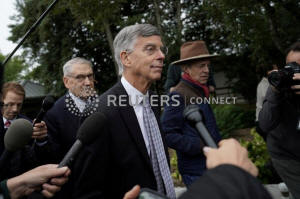Advice for impeachment witnesses: don't let lawmakers get under your
skin
 Send a link to a friend
Send a link to a friend
 [November 13, 2019]
By Karen Freifeld and Jan Wolfe [November 13, 2019]
By Karen Freifeld and Jan Wolfe
WASHINGTON (Reuters) - As televised
hearings on whether to impeach U.S. President Donald Trump begin this
week, witnesses are preparing for a grilling by lawmakers keen to score
political points in front of ranks of TV cameras, watched by a public
tuning in that may not know the whole story.
The testimony from State Department witnesses presents the first
opportunity for the public to hear directly from those most closely
involved in the events that sparked the impeachment inquiry, and will
likely play a key role in building or eroding support.
Democrats are investigating whether Trump pressured Ukraine to tie
security aid to probes that might benefit his 2020 re-election bid.
Trump has denied any wrongdoing and branded the investigation a hoax.
Jack Quinn, who once served as White House counsel to President Bill
Clinton, said the witnesses must maintain equanimity, despite hostile
questioning they are likely to face from Republicans like Ohio
Representative Jim Jordan, a Trump supporter.

"The important thing is that they not let someone like Jordan get under
their skin and cause them to say something that could be interpreted as
bias," he said.
He said witnesses should not act like they are "out on the back porch
with your next door neighbor... You don't need to be chatty. You need to
be accurate and precise."
The two witnesses set to appear on the first day of public hearings on
Wednesday - Bill Taylor, the top U.S. diplomat in Ukraine, and deputy
assistant secretary of state George Kent - have already answered
questions behind closed doors for House committees probing whether U.S.
policy in Ukraine was tainted by the president for personal gain.
The testimony will be carried by major broadcast and cable networks and
is expected to be viewed by millions, who will watch current and former
officials from Trump's own administration begin to outline a case for
his potential removal from office.
It has been 20 years since Americans last witnessed impeachment
proceedings, when Republicans brought charges against then-Democratic
President Bill Clinton.
[to top of second column]
|

Acting U.S. ambassador to Ukraine Bill Taylor arrives to testify at
a closed-door deposition as part of the U.S. House of
Representatives impeachment inquiry led by the House Intelligence,
House Foreign Affairs and House Oversight and Reform Committees on
Capitol Hill in Washington, U.S., October 22, 2019. REUTERS/Carlos
Jasso/File Photo

CONNECTING THE DOTS
Nick Allard, who worked for former Senator Ted Kennedy on the
Judiciary Committee and is now a professor at Brooklyn Law School,
said the witnesses should describe their resumes to show they are
experienced public servants who have served under both Democratic
and Republican administrations.
Allard said they also should be ready to explain how the Trump
administration's actions in Ukraine compare to other experiences in
their careers. "Is it anything you've seen before? Is it normal, or
is it highly abnormal or unprecedented?"
Democrats will want the witnesses to connect the dots to help people
understand what happened, why the aid was blocked and by whom, and
the role of the president's lawyer Rudy Giuliani.
There may be cinematic moments, said Allard, recalling how, in 1973,
White House former deputy chief of staff Alexander Butterfield told
the world that President Richard Nixon had a taping system in the
Oval Office, a revelation during the 'Watergate' hearings that
helped lead to his resignation.
"I remember that vividly," Allard said. "People's jaws dropped.
"You could have that kind of moment here."
(Reporting by Karen Freifeld and Jan Wolfe; Editing by Chris
Sanders, Noeleen Walder and Rosalba O'Brien)
[© 2019 Thomson Reuters. All rights
reserved.]
Copyright 2019 Reuters. All rights reserved. This material may not be published,
broadcast, rewritten or redistributed.
Thompson Reuters is solely responsible for this content.
 |